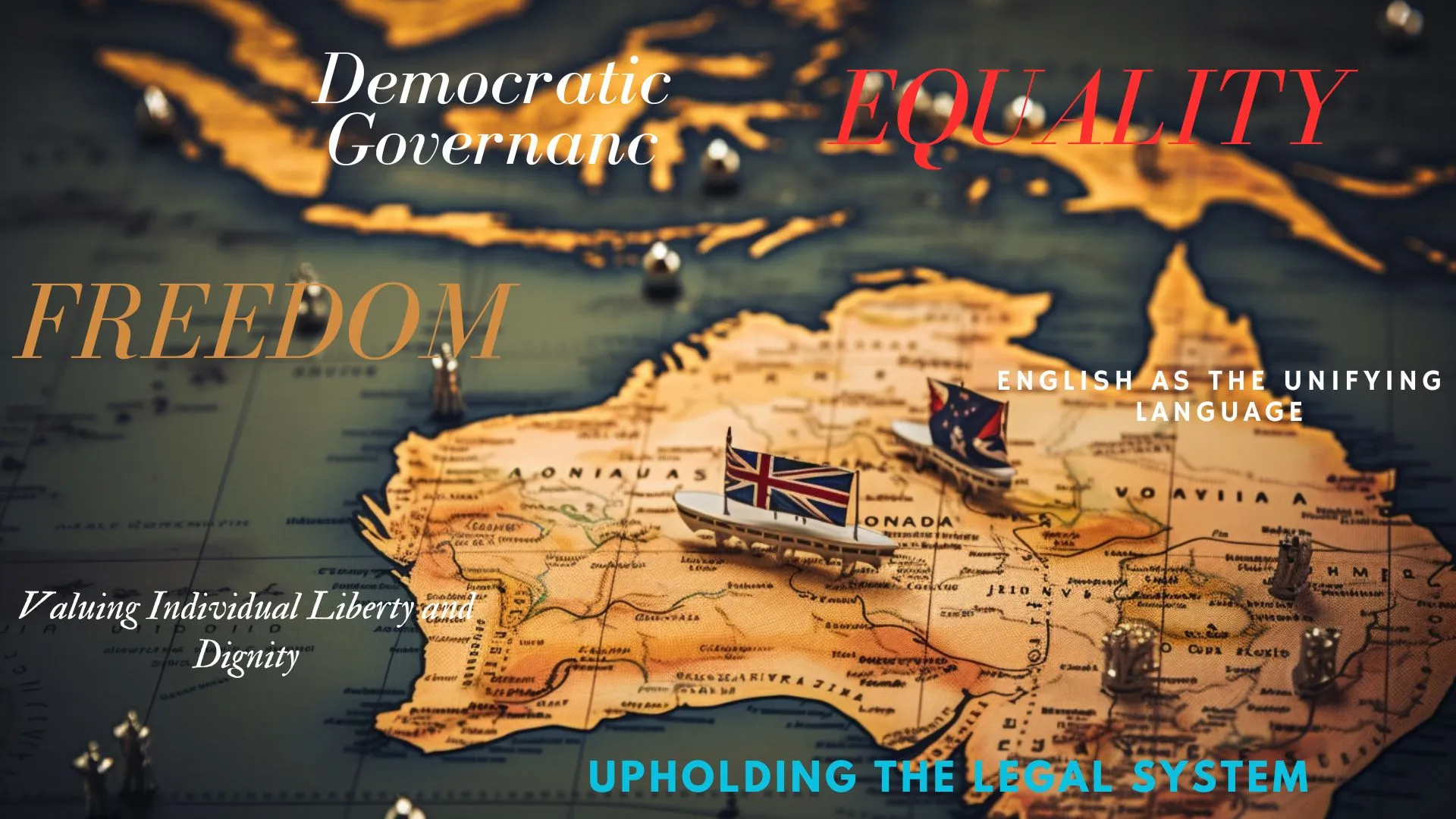A Comprehensive Exploration
Australia a land of stunning landscapes and diverse cultures is a melting pot of values that define its people and their way of life.
But what are these values and where do they come from?
This article aims to explore the core values that Australia holds dear, the vision behind them and how they are evolving.

The Bedrock of Values in Australia
According to the Department of Home Affairs, the core principles that shape Australia are liberty, mutual respect, justice, and equal chances for everyone.
These principles play a pivotal role in ensuring the nation’s wellbeing and tranquility. They encompass individual liberties, the right to practice any faith or none, freedom of expression, and the freedom to associate.
Additionally, there’s a strong emphasis on adhering to the legal system and the democratic process. The Australian Values Statement, or AVS, serves as a guide for newcomers to Australia, requiring them to recognize and commit to these principles.
The purpose of the AVS is to help newcomers grasp the principles that have fostered a society that is both stable and harmonious, yet also vibrant and diverse.
Here’s a breakdown of what Australian values entail:
- Valuing Individual Liberty and Dignity: Respecting each person’s freedom and self-worth.
- Freedom of Faith and Expression: Including the right to not adhere to any religious beliefs, alongside the freedom to speak one’s mind and associate freely.

- Upholding the Legal System: A commitment to the principle that everyone is accountable to the law and should abide by it.
- Democratic Governance: Laws are made by elected parliaments, which are the supreme authority, superseding any other conflicting religious or secular codes.
- The ‘Fair Go’ Principle: This includes mutual respect, tolerance, empathy for those who are disadvantaged, and equal opportunities for everyone.
- English as the Unifying Language: Recognizing English as the national language and an essential element that brings Australians together.
- Equal Opportunities for All: Regardless of factors like gender, sexual orientation, age, disability, ethnicity, or national origin.
What is the vision behind it?
The vision behind these values is to create a society that is not only stable and peaceful but also dynamic and diverse.
The Australian government has even updated the Australian Values Statement (AVS) to make it more meaningful and to reflect the importance placed on these defining values.
Origins and Foundations of Australian Values
Australia’s core values have evolved from a rich tapestry of historical and cultural influences. Here’s a deeper look into the roots and basis of these values:
British Colonial Heritage
Australia was colonized by the British in the late 18th century, and the legal and political systems were initially modelled after those of the United Kingdom. The principles of parliamentary democracy and the rule of law were inherited from this period, shaping the nation’s governance and societal structure.
Indigenous Culture
Before British colonization, Indigenous peoples had lived in Australia for tens of thousands of years. Their cultures, traditions, and connection to the land have had a lasting impact on Australian values, particularly in terms of respect for the environment and a deep sense of community.
Waves of Immigration
Australia is a nation built on immigration, with people coming from all corners of the globe. Each wave of immigrants has brought its own set of values, traditions, and beliefs, contributing to the country’s rich cultural diversity. This has led to a society that values equality of opportunity and the freedom to practice one’s religion and culture.
Government Formalization
The Australian government has played a significant role in formalizing these values. The Australian Values Statement (AVS) is a key document that outlines these principles, serving as a guide for newcomers to the country. The AVS not only helps immigrants understand what Australia stands for but also encourages them to commit to these values as they become part of Australian society.
Australia’s values are a blend of historical legacies, Indigenous contributions, and the diverse beliefs brought by immigrants.
These are then formalized by the government to create a cohesive yet dynamic society.
The Academic Angle: Australian Values Study
The Australian Values Study (AVS), conducted by the Social Research Centre, is part of the World Values Survey.
It has been tracking changes in the values and beliefs of citizens in 97 countries, including Australia, since 1981.
The AVS has identified several key themes:
- Respect for Authority: Despite a reputation for larrikinism Australians have a keen respect for authority and are open to strongman and technocratic styles of government.
- Democracy and Trust: Australians are committed to the concept of democracy and are broadly satisfied with how it is functioning. However confidence in civic and political organisations is declining.
- Mixed Views on Immigration: Australians believe that migrants make the country more diverse and vibrant but also think that immigration increases social conflict.
- Spirituality: Around half of all Australians believe in God and an afterlife with heaven and hell.
The Changing Landscape
While the core values have remained relatively stable, there is a growing debate about how they are evolving. Some argue for a return to Christian roots citing the moral and ethical framework that Christianity provides.
However as Australia becomes increasingly multicultural there’s a question of how these values can adapt to include a broader range of beliefs and practices.
The Role of Christian Values in Australian Society
The influence of Christian values in Australia is undeniable deeply rooted in the nation’s history and cultural fabric.
According to Australian Christians core values are based on Judeo-Christian heritage, which is ultimately outlined within the Bible.
The organization is unapologetic about basing its policies and core values on this heritage aiming to ensure that every Australian, regardless of age or physical condition receives the best protection, support and opportunities to contribute to life-affirming ways.

Moral Framework: The Cornerstone of Ethical Governance
Christian values offer a robust moral framework that can significantly influence the ethical landscape of governance. These values deeply rooted in Biblical teachings, serve as a guiding light for lawmakers and public servants.
By adhering to principles like honesty, integrity and justice, governments can enact laws and policies that are not only fair but also promote social equality. This moral compass can be particularly beneficial in tackling complex ethical issues such as healthcare, education and social welfare, ensuring that decisions are made with the greater good in mind.
Community Building: Fostering Unity and Inclusivity
Christian teachings place a strong emphasis on the values of community, charity and compassion. When these principles are integrated into governmental policies the result is a society that is more inclusive and supportive.
Programs that focus on community welfare such as affordable housing, mental health services and educational opportunities can be designed with these Christian values at their core. This approach fosters a sense of belonging among citizens, reducing social inequalities and enhancing the overall quality of life.
Emphasis on Family: Strengthening the Social Fabric
Family is a cornerstone in Christian teachings and this focus can translate into government policies that bolster family life. Initiatives like extended parental leave family friendly work environments and child care support can be more effectively implemented when guided by Christian values.
By strengthening family bonds, governments can create a stable social environment that benefits not just individual families but society as a whole.
Social Cohesion: Building a Harmonious Society
The Christian faith champions principles like forgiveness, love and tolerance, which are essential for social cohesion. Governments that incorporate these values into their policies can foster a more harmonious society.
This can be particularly impactful in multicultural settings where diverse groups coexist. Policies that promote tolerance and understanding can help mitigate social tensions, leading to a more peaceful and cohesive society.
Charitable Works: Extending a Helping Hand
The Christian community in Australia is actively involved in various charitable activities from food banks to shelters. When these charitable principles are adopted by the government they can provide a robust safety net for those in need.
Governmental programs that focus on poverty alleviation, homelessness and disaster relief can benefit from the Christian ethos of charity, ensuring that the most vulnerable sections of society are not left behind.
By incorporating Christian values into governance Australia has the potential to create a more ethical, inclusive and harmonious society.
These values can serve as a guiding light helping to navigate the complexities of modern governance while ensuring that the welfare of all citizens is a top priority.
The Way Forward
Australia’s values are its backbone providing a framework for how its people live, work and interact with each other.
As the country continues to evolve so too will the interpretation and application of these values. Whether that means a return to Christian roots or an adaptation to include a more diverse range of beliefs remains to be seen.

What is clear is that these values are deeply ingrained in the Australian psyche and are a significant part of what makes the country unique.











